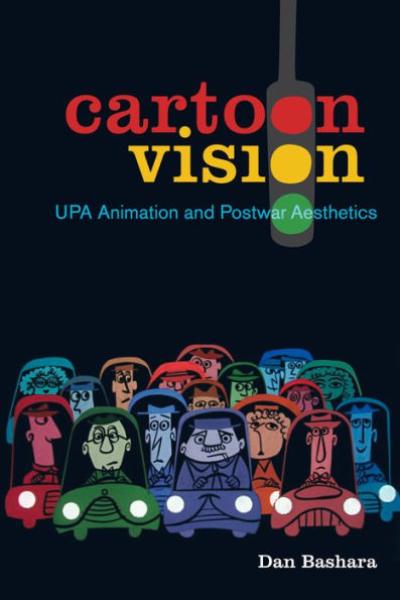Description
In Cartoon Vision Dan Bashara examines American animation alongside the modern design boom of the postwar era. Focusing especially on United Productions of America (UPA), a studio whose graphic, abstract style defined the postwar period, Bashara considers animation akin to a laboratory, exploring new models of vision and space alongside theorists and practitioners in other fields. The links--theoretical, historical, and aesthetic--between animators, architects, designers, artists, and filmmakers reveal a specific midcentury modernism that rigorously reimagined the senses. Cartoon Vision invokes the American Bauhaus legacy of László Moholy-Nagy and György Kepes and advocates for animation's pivotal role in a utopian design project of retraining the public's vision to better apprehend a rapidly changing modern world.
"Cartoon Vision examines American animation alongside the modern design boom of the postwar era. Focusing especially on United Productions of American (UPA), a studio whose graphic, abstract style defined the postwar period, Daniel Bashara considers animation as a laboratory exploring new models of vision and space, tracing the links--both literal and aesthetic--between animators, architects, and designers developing a midcentury modernism that rigorously reimagined the senses. Invoking the American Bauhaus legacy of Lâaszlâo Moholy-Nagy and Gyèorgy Kepes, Cartoon Vision advocates for animation's pivotal role in a utopian design project of retraining the public's vision to better apprehend a rapidly changing modern world"--Provided by publisher.
"Cartoon Vision treats animation with all the seriousness it deserves, and in so doing captures a messier modernism that rightly brings avant-garde practice into contact with a more diverse field of popular taste."-- "Oxford Art Journal"
"Cartoon Vision examines American animation alongside the modern design boom of the postwar era. Focusing especially on United Productions of American (UPA), a studio whose graphic, abstract style defined the postwar period, Daniel Bashara considers animation as a laboratory exploring new models of vision and space, tracing the links--both literal and aesthetic--between animators, architects, and designers developing a midcentury modernism that rigorously reimagined the senses. Invoking the American Bauhaus legacy of Lâaszlâo Moholy-Nagy and Gyèorgy Kepes, Cartoon Vision advocates for animation's pivotal role in a utopian design project of retraining the public's vision to better apprehend a rapidly changing modern world"--Provided by publisher.
"Cartoon Vision treats animation with all the seriousness it deserves, and in so doing captures a messier modernism that rightly brings avant-garde practice into contact with a more diverse field of popular taste."-- "Oxford Art Journal"
Last updated on
Product Details
- University of California Brand
- Apr 2, 2019 Pub Date:
- 0520298136 ISBN-10:
- 9780520298132 ISBN-13:
- 296 Pages
- 9.1 in * 6.1 in * 1.1 in Dimensions:
- 1 lb Weight:




